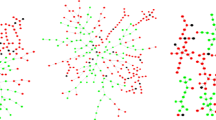Abstract
The paper extends the research program of modeling the Schumpeterian vision of innovative development in the Arrow-Debreu theory of general equilibrium. The core of this set-up is based on modeling the two fundamental forms of economic life distinguished by Schumpeter, namely the circular flow and economic development by specific extensions of the production system being part of the Debreu private ownership economy, so that the analysis includes static as well as dynamic forms. In this context the paper aims at studying the mechanisms of Schumpeterian evolution in the conceptual apparatus of the Hurwicz’s theory of economic mechanisms. To this purpose two kinds of mechanisms of Schumpeterian innovative evolution are studied. First, price mechanisms which include prices as an element of the message space, and second, qualitative mechanisms which, in addition, guarantee that the position of a group of agents will get better off with respect to the given criterion.

Similar content being viewed by others
References
Aghion P, Howitt P (1992) A model of growth through creative destruction. Econometrica 60:323–351
Aghion P, Howitt P (1998) Endogenous growth theory. MIT Press, Cambridge, Mass. and London
Alchian A (1950) Uncertainty, evolution and economic theory. J Polit Econ 57:211–221
Andersen ES (2009) Schumpeter’s evolutionary economics. Anthem Press, London
Ciałowicz B, Malawski A (2011) The role of banks in the Schumpeterian innovative evolution–an axiomatic set-up. In: Pyka A, Derengowski F, da Graca M (eds) Catching up, spillovers and innovations networks in a Schumpeterian perspective. Springer, Heidelberg, Dordrecht, London, New York
da Graça Moura M (2002) Metatheory as the key to understanding: Schumpeter after Shionoya. Camb J Econ 26(6):805–821
Day RH (2007) The mechanisms of economic evolution: completing Schumpeter’s theory. In: Hanusch H, Pyka A (eds) Elgar companion to neo-schumpeterian economics (2007). Edward Elgar, Cheltenham, UK, Northampton, MA, USA, pp 745–753
Debreu G (1959) Theory of value. Viley, New York
Duffie D (1988) Security markets, stochastic models. Academic Press
Foster J (2000) Competitive selection, self-organisation and Joseph A. Schumpeter J Evol Econ 10(3):311–328
Foster J (2011) Evolutionary macroeconomics: a research agenda. In: Pyka A, Derengowski F, da Graca M (eds) Catching up, spillovers and innovations networks in a Schumpeterian perspective. Springer, Heidelberg, Dordrecht, London, New York
Freeman C (1982) The economics of industrial innovations, 2nd edn. Printer, London
Hanusch H, Pyka A (2007) Schumpeter, Joseph Alois (1883–1950). In: Hanusch H, Pyka A (eds) Elgar Companion to neo-schumpeterian economics. Edward Elgar, Cheltenham, pp 19–26
Hayek FA (1945) The use of knowledge in society. Am Econ Rev 35(4):519–530
Hodgson GM (1993) Economics and evolution: bringing life back into economics. Polity Press, Cambridge
Hodgson GM (2006) What are institutions? J Econ Issues 40(1):1–25
Hodgson GM (2007) Meanings of methodological individualism. J Econ Methodol 14(2):211–226
Hurwicz L (1960) Optimality and informational efficiency in resources allocation process. In: Arrow K, Karlin S, Suppes P (eds) Mathematical methods in the social sciences. Stanford University Press, Stanford
Hurwicz L, Reiter S (2006) Designing economic mechanism. Cambridge University Press, New York
Jordan J (1982) The competitive allocation process is informationally efficient uniquely. J Econ Theory 28:1–18
Klepper S (1996) Entry, exit, growth and innovation over the product life cycle. Am Econ Rev 86:562–583
Lipieta A (2010) The Debreu private ownership economy with complementary commodities and prices. Econ Model 27:22–27
März E (1991) Joseph Schumpeter: scholar, teacher and politician. Yale University Press, New Haven
Magill M, Quinzii M (2002) The theory of incomplete markets. MIT Press, Cambridge
Malawski A (2004) Beyond Schumpeterian illusions: from general equilibrium to evolutionary economics; the paper presented at the International Schumpeter Society Meeting, Milan, 9–11 June 2004, Italy
Malawski A (2005) A dynamical system approach to the arrow-Debreu theory of general equilibrium. 9th World Multi-Conf Syst, Cybernet Inform, Proc 2005, Orlando, Florida, USA VII:434–439
Malawski A (2008) Distributive justice and Schumpeterian innovative evolution – an axiomatic approach in the context of social cohesion. In: Ostasiewicz W (ed) Proceedings of the Fourth International Conference on Quality of Life Improvement through Social Cohesion. Wrocław University of Economics, Wrocław, pp 80–98
Malawski A, Woerter M (2006) Diversity structure of the schumpeterian evolution. an axiomatic Approach; Arbeitspapiere/Working Papers of the Swiss Institute for Business Cycle Research, No 153, Oct. 2006, Zurich
Malerba F (2005) Sectoral systems: how and why innovation differs across sectors. In: Fagerberg J, Mowery DC, Nelson RR (eds) The Oxford handbook of innovation. Oxford University Press, Oxford, pp 380–406
Malerba F, Orsenigo L (1995) Schumpeterian patterns of innovation. Camb J Econ 19:47–65
Malerba F, Orsenigo L (1997) Technological regimes and sectoral patterns of innovative activities. Ind Corp Chang 6:83–117
Mas-Colell A, Whinston MD, Green JR (1995) Microeconomic theory. Oxford University Press, New York
Nelson R, Winter S (1982) An evolutionary theory of economic change. Belknap Press of Harvard University Press, Cambridge
Elgar Companion to Neo-Schumpeterian Economics (2007), H. Hanusch, A. Pyka, eds., Edward Elgar, Cheltenham, UK, Northampton, MA, USA
Schubert C (2012) Is novelty always a good thing? towards an evolutionary welfare economics. J Evol Econ 22(3):585–619
Schumpeter JA (1908) Das Wesen und der Hauptinhalt der theoretischen Nationalökonomie. Duncker & Humblot, Leipzig
Schumpeter JA (1912) Die Theorie der wirtschaftlichen Entwicklung, Leipzig: Duncker & Humblot; English translations: The theory of economic development, Cambridge, MA: Harvard University Press 1934 and A Galaxy Book, New York, Oxford University Press 1961
Schumpeter JA (1950) Capitalism, socialism and democracy, 3rd edn. Harper, New York
Schumpeter JA (1964) Business cycles: a theoretical, historical, and statistical analysis of the capitalist process, McGraw-Hill, New York, London (1939), abrth edn. McGraw-Hill, New York
Shionoya Y (1990) Instrumentalism in Schumpeter’s economic methodology. Hist Polit Econ 22(2):187–222
Shionoya Y (1997) Schumpeter and the idea of social science: a methodological study. Cambridge University Press, Cambridge
Shionoya Y (2007) Schumpeterian universal social science. In: Hanusch H, Pyka A (eds) Elgar Companion to Neo-Schumpeterian Economics (2007). Edward Elgar, Cheltenham, UK, Northampton, MA, USA, pp 55–65
Shionoya Y (2015) Schumpeter and evolution: an ontological exploration. http://www.lib.hit-u.ac.jp/service/tenji/amjas/Shionoya18.pdf. Accessed 29 Dec 2015
Simon HA (1955) A behavioural model of rational choice. Q J Econ 69:99–118
Simon HA (1957) Models of man: social and rational. Wiley, New York
Simon HA (1972) Theories of bounded rationality, chapter 8. In: McGuire CB, Radner R (eds) Decision and organization. North-Holland Publishing Company, Amsterdam
Acknowledgments
This work was supported by Polish Ministry of Science and Higher Education - Grant NN111295738.
We would like to thank two anonymous referees who offered very helpful, critical comments, which allowed us to improve the quality of the paper.
Author information
Authors and Affiliations
Corresponding author
Rights and permissions
About this article
Cite this article
Lipieta, A., Malawski, A. Price versus quality competition: in search for Schumpeterian evolution mechanisms. J Evol Econ 26, 1137–1171 (2016). https://doi.org/10.1007/s00191-016-0470-8
Published:
Issue Date:
DOI: https://doi.org/10.1007/s00191-016-0470-8



